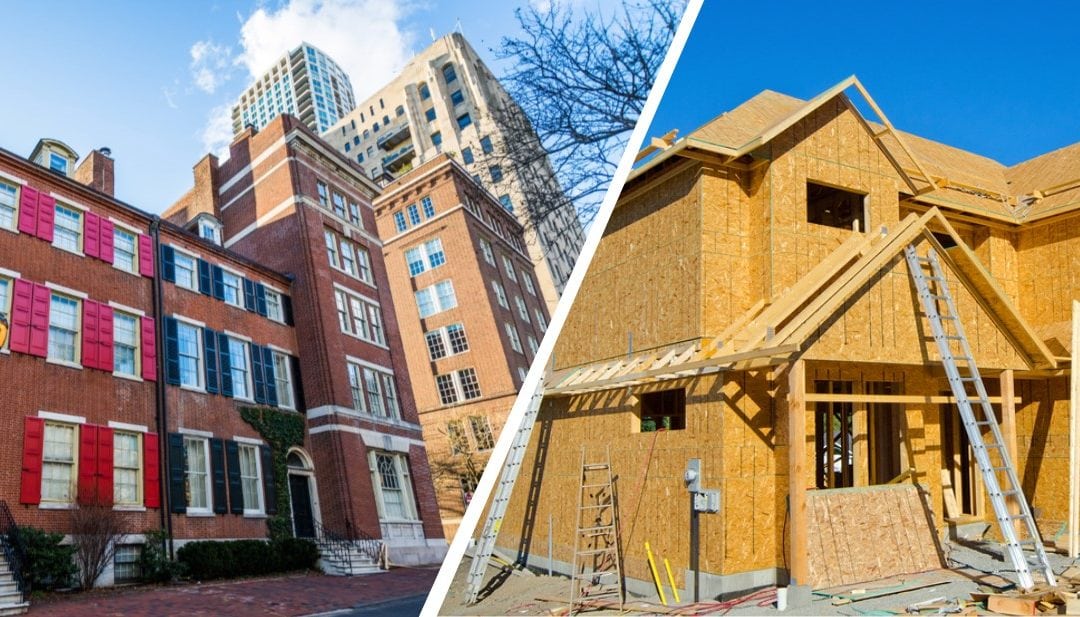Bridge vs. New Construction is a comparison of two types of hard money loans that both serve real estate investors and developers. Both loan programs function as financing tools to acquire a piece of land or structure for investment purposes. Determining which is more advantageous to you depends on your investment strategy and the length of your project.
Bridge loans are a financing option for investors looking to quickly purchase a property or piece of land for investment purposes. In DC’s highly competitive market, it can be challenging to juggle finding the perfect property, qualifying for long-term financing, and purchasing it before the competition. To secure the property they want, investors will use a bridge loan as a short-term financing solution and then refinance into long-term, permanent financing later.
New construction loans provide funding for developers looking to purchase shovel-ready land or land with a property on it that they intend to tear down. Funding for this type of project covers the cost to purchase “shovel-ready” land as well as construction costs involved in building a new structure. “Shovel-ready” land means land that has plans, zoning and issued permits in place. Having these ready allows for construction to begin immediately after closing.
Bridge Loans vs. New Construction Loans
A major difference between these two is that new construction loans fund the construction of a new structure, whereas bridge loans allow investors to purchase a land or property, but typically do not fund any construction costs. Investors who obtain a bridge loan will usually begin construction after they have refinanced out into their long-term loan. Use the chart below to explore some of the other differences between a bridge and new construction.
| Bridge Loans | New Construction Loans |
|---|---|
| Funds to purchase “shovel-ready” land or land with an existing structure to flip | Funds to purchase “shovel-ready” land or land with an existing structure to teardown and rebuild |
| Developer will typically pay off the existing loan by refinancing into another loan | Developer will pay off the loan upon selling the property |
| Rarely includes funds for construction | Almost always includes funds for construction |
When is a Bridge Loan Better
Bridge financing would be a better choice for an investor in the situations below.
Need a Short-Term Loan now but will Refinance Later
Investors that need financing for a short period of time before refinancing into a long-term loan should use bridge financing. It will enable them to acquire their property quickly, sometimes within a few days. Because bridge loans are so flexible, investors can refinance into a long-term loan whenever they are ready and have all of the required permits and documentation.
Doing a Construction-Heavy or Development Project
Developers doing construction-heavy, commercial or mixed-use projects in hot spots like Washington DC typically plan for well over 12 months of work. Since most hard money loans have a 12-month loan term, developers will acquire the property through a bridge loan and get the required zoning and permit approvals in place. With these in place, they will then refinance out with another lender for a lower, long-term interest rate.
When is a New Construction Loan Better
New construction is a better option for investors and developers if they are dealing with any of the situations listed below.
Buying a Plot of Land to Build a New Structure(s)
If you’re looking to purchase a plot of “shovel-ready” land you would use a new construction loan. With this funding, you’ll be able to acquire the desired land and finance the new development on the property.
Buying a Distressed Property to Tear Down and Build a New One
If you’re planning to tear down and rebuild a structure on a piece of land, new construction is your best financing option. Investors that see value in land that houses a severely burned or mold-infested property will use this loan to tear down the structure and build a new one.
Need Financing to Buy Land and Begin Construction Immediately
Developers who have the required documentation to begin construction on a piece of land are often able to close on a new construction loan quickly and efficiently. The hardest part of new construction is getting the needed permits, so if you already have them, this loan will give you the funds released in “construction draws” to start building.

